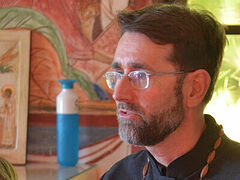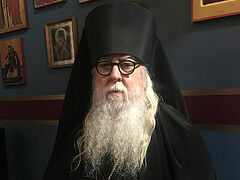Fr. George converted to the faith while doing research in the sphere of nuclear technology and became a priest after a confrontation with the criminal world. He is the head of the deanery of Scotland, Northern Ireland and the Isle of Man of the Diocese of Sourozh. He holds a Ph.D. in Philosophy and Technical Science, a Masters in Theology, and membership in the Russian Writers’ Union.
—You were born in the Soviet Union, received an excellent technical education, and in the early 1990s you founded your own company. How did you convert to the faith? Was this treasure carefully preserved and inherited in your family during the Soviet, era or did something happen that directed you to the spiritual path?
—I graduated from Moscow Engineering and Physics Institute, took a postgraduate course and defended my Ph.D thesis. It was dedicated to nuclear reactor management. That’s why my book, The Atomic Pastor, appeared.
So, in the process of writing on the control of the energy release field of a channel-type nuclear reactor, spending hours alone with my manuscript in the office of the first department, I turned to God. On the one hand, it was an intellectual path; on the other hand, my heart gave the spiritual impulse. Then I was baptized and received my first Communion. It was at the Church of the Kazan Icon of the Mother of God in Kolomenskoye, Moscow. It was not until many years later that I decided to become a priest and entered St. Tikhon’s Orthodox University of the Humanities. My mind and the heart in synergy brought forth this fruit: I became an Orthodox Christian.
I am convinced that it was God’s will for me to become Orthodox, and in the future a priest. I couldn’t perceive any other path for myself. A physicist suddenly decides to become an Orthodox Christian. I tried to express all my inner dialogues about this choice in the novel, The Atomic Pastor.
—Many people will want to read the book after our talk. But if you express the essence of those inner dialogues, what was the key moment for you?
—The dialogues I give in the novel echo my personal dialogues and reflections on the path to God. Imagine a person who devoted his life to mathematics, the derivation of complex formulas...
In those days I felt that faith is the most important thing in people’s lives as it organizes and builds up our lives. I thought that if I did not deal with this closely, I would be wrong. My life would be unfulfilled!
But faith is the evidence of things not seen (Heb. 11:1). I learned this later when I read the Epistles. In the Soviet era, faith was associated with something outdated: old women in headscarves who only aroused pity. For an adult engaged in science there could be no thought of faith in a God Whom no one has ever seen. This question became acute, especially in connection with what I was doing. The main character of my novel was engaged in nuclear technology. I was not an inventor like him (his formula led to the creation of a new type of weapon). But what matters is that the moment of awareness came for my character and myself alike: how is it that I put all my energy into making a deadly weapon?
—But how will Russia manage without weapons?
—Sure! Logically, this is absolutely correct and understandable. But in my mind faith in God was incompatible with this field. And in my novel the character imagines apocalyptic scenes: destroyed megalopolises covered with nuclear dust, dying animals and people doomed to perish, without shelter, without purpose, without life. They were not just dying, but remaining in an environment that after the exchange of nuclear strikes lost its meaning.
Many of my colleagues remained in the nuclear industry, while I left. But it doesn’t evoke the slightest reproach on my part. For me faith in God and participation in the production of weapons of mass destruction were incompatible. It’s true and sincere, and my largely autobiographical novel is about this. For example, the relationship in the novel between the son and his father, an officer, who asks perplexed, “How can you trade all your achievements, your career, and your future for some incomprehensible faith?” Something similar happened in my life too.
—Did you have apocalyptic visions like those of the main character?
—I did in fact. The windows of my apartment in Moscow overlooked the ZIL vehicle manufacturing plant. I thought that should there be a nuclear attack, that strategic facility would be hit first. I had the following dream-vision: I woke up on an early summer morning, went up to my desk opposite the window, sat down, and looked out of the window. I saw, as if in slow motion, a mushroom cloud slowly rising and growing. I was looking at it as if it were a picture that had nothing to do with me. Suddenly a thought pierced my mind: “Why? This is all real—I can see it!” In the novel the protagonist’s vision is expressed in accordance with what I experienced in my life. This was before my Baptism—a vivid image.
— Having converted to the faith through reflection on a nuclear apocalypse, you were baptized and became a Christian. Well, you could have just gone to church on Sundays, but you became a churchwarden.
—At first I was a “Sunday Christian”: I attended services, prayed, confessed, received Communion. I had some projects related to software development for the nuclear industry. But I came to the conclusions that it was necessary to make a decision. And there were circumstances that pushed me to the idea that I should study and become a priest. I went to a church and said: “Let me be helpful to you.” And I became a churchwarden of a newly founded parish on Tverskaya Street in central Moscow.
There were many lawsuits to defend in that church. In 1993, Yeltsin issued a decree to return church buildings to the Moscow Patriarchate, but no action followed the decree. Many church buildings in Moscow were occupied by organizations, which needed to be evicted. We appealed to the Supreme Court in our struggle for the building to be transferred to the Russian Orthodox Church. It was my work as a churchwarden, after which I submitted documents for my ordination to the then Archbishop Arseny of Istra, our vicar bishop in Moscow. As a churchwarden I continued to work at Gazetny Lane, and I was ordained in the church that I attended as a reader—the OCA Representation Church on Bolshaya Ordynka Street. With the blessing of reposed Archpriest Daniel Gubyak I was ordained deacon and served for four years. Then I became a priest and was sent to serve in Dublin. I began by establishing parishes in Ireland—in Dublin, Cork, Limerick, Galway, Belfast, Waterford and Stradbally. New parishes appeared, new clergy were ordained. Most of them are my former students. They all came from the Dublin parish where I served for almost nine years. I had worked in the DECR in Moscow. Then by decree of Patriarch Kirill I was sent to Scotland to set up this deanery of parishes. We had four ordinations: one deacon and three priests. For parishes abroad, it was progress.
—You mentioned some harsh circumstances that prompted you to immerse yourself in church life.
—These were the crazy 1990s. I had my own business and was faced with some external threats that turned me away from the idea of doing business. There was a serious threat to my life. I see God’s intervention in this story. I realized that I could no longer live like that, remaining a “Sunday Christian,” continuing my secular work. Those events were like a real horror movie.
My business was of a certain kind and level. Two criminal groups were sharing it, though they weren’t participating in it. I was invited as a “defendant”. A dispute arose between those “structures”, and I as the owner and manager was to decide which one I was with. The question had been resolved, but they were expecting answers from me. And I set off for that cursed meeting but got into a traffic jam. I stood for an hour or an hour and a half. The meeting had already taken place, and I don’t even know what they decided because that was the end of my dealings with them.
—While talking about the 1990s, let’s turn to the most vivid memories of church life in Russia during the era of the Church’s revival.
—That was, of course, the 1000th anniversary of the Baptism of Rus’ in 1988, then a colossal influx of people wishing to get baptized. A hundred people would be baptized at a time! 1994–1995 is a period of deeper understanding, then a certain outflow from the Church and cooling of people’s zeal began. But churches were being restored.
I recall how we retook a church in the center of Moscow. We started from its basement. Bandits came, who intended to open a nightclub there. I had the “pleasure” of seeing those “brethren” and speaking with them. But they disappeared by themselves. There was also opposition from the Russian Composers Union, which had its building in the neighborhood. In the end we received a government certificate that the building was transferred to the church community. This was perhaps the most striking event—we succeeded in winning back the church.
I also remember going to Optina Monastery, where I met with Elder Iliy (Nozdrin). I personally received his blessing for my priestly ministry. Not everything was easy at the time. Not everyone in Moscow managed to become a priest, either. Your education didn’t guarantee your ordination.
—Why were you sent to serve in Ireland?
—On the recommendation of Fr. Hilarion (Alfeev), now Metropolitan of Volokolamsk. He spiritually guided me in those days, continues to do so to this day. He introduced me to Metropolitan Kirill (now Patriarch) after their trip to England, when Vladyka Anthony of Sourozh was still alive. Then they went to Ireland and decided that it was necessary to launch an Orthodox mission there. Since I had good command of English and a good education, and they simply knew me well, they decided to send me. I saw God’s Providence in that and gladly agreed.
—Today you are the dean of the parishes of Scotland and Northern Ireland of the Diocese of Sourozh. What surprised you as a Russian priest most of all? What stuck in your mind, or was a real culture shock?
—Scotland is very different from Ireland in terms of language and way of life. And people are different there. The Scots are children of the mountains. The Irish are Catholics and the Scots are Presbyterians. If Anglicanism emerged as a protest against the papacy, Presbyterianism was a protest against Anglicans. A protest to a protest, as it were. I had already served in Ireland before, and in the northern part of the island everything was very familiar to me. I had been literally welcomed with open arms there and invited everywhere. But in Scotland it was difficult to establish good relations with people. We were welcomed, but rarely invited anywhere—the mentality shows.
But I love Scotland. It is a country of stunning beauty. And people gradually open up to you, including through our parishioners who married Scots. Interestingly, there are more mixed marriages (which is typical for parishes of the Russian Diaspora) in Scotland.
—Has a Scottish husband ever become Orthodox through his Orthodox wife? Tell us one of your most memorable stories.
—I answer with joy and pride: Yes, this has happened, and more than once! The most striking story: He is a Scotsman, and she is Russian. She emigrated, got married, and I married them in church. But first I baptized him. The man made this decision consciously. I had talks with him, catechized him, and his wife was my helper. Beautiful family! And this story gave me great joy. They solidly integrated into parish life together with their children. She has a daughter and he has a son from their previous marriages. And their own son was born in Scotland. I will not give their names, but the story is awesome!
Do you know what struck me? He deeply delved into the essence of what we call Orthodoxy. It was not a formal baptism before the wedding. I told them: “I can marry you because one of you is Orthodox and the other is a Protestant—the canons allow this.” But he himself wanted it.
There were other cases as well. And there are new ones that await me. I will fly back there when it becomes possible to worship there again. Those wishing to marry in Scotland and Northern Ireland are next in line. The process is underway! It is very important. People are bound by love, and it is above our denominational differences. Here we see that decisions are made based on the fact that people love each other. He or she is ready to follow his or her significant other.
In this sense, it turns out that Orthodoxy is stronger than other traditions! We don’t try to win anyone over—people themselves want to embrace our faith. But they solve the problem in favor of Orthodoxy (and not Catholicism or Protestantism) and out of love. This is an exceptional testimony for you and me. And I was fortunate enough to see such evidence both in Scotland and in Northern Ireland.
—It’s really inspiring. But let’s return to the parishes. How many parishes are there in the deanery today?
—Scotland: Glasgow, Edinburgh, Aberdeen and Dundee. Northern Ireland: Belfast, Newry and a parish in Douglas—the capital of the Isle of Man.
—Seven parishes scattered at a decent distance from each other are a serious burden. How do you manage to arrive at each on time?
—By plane, by car. Now it’s easier because I have assistants. But at the beginning I was alone. I would get up at two or half past two in the morning, get behind the wheel and arrive at six to start the Liturgy at seven—and it was on weekdays. It was like this in Glasgow and Edinburgh with an hour’s drive between them. And in recent years I have travelled by plane. I don’t know if any other priest travels to the liturgy by plane.
—You are the first priest I’ve ever met to do so.
—I get up in the morning, go to the airport, get on a plane, arrive, then they pick me up, bring me to church and I celebrate the Liturgy. And then they take me to the airport again, I get on a plane, fly across the Irish Sea and return home. This is my practice.
—From the ship to the ball.1
—From a plane to a ball! When you do it, you don’t really notice anything unusual about it. No big deal getting on a plane and flying to the Liturgy. I rise at three, then get on the bus, the airport, check-in, plane, airport again, and at eight I am already in church and start serving. In the afternoon I fly back. And I do it every week. At least this was the case before the pandemic. Now we are limited in our movement.








